#Dios
Text
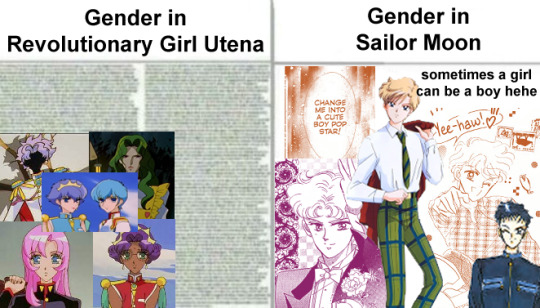
#before anyone gets confused: the orange boy is Minako and the pink one is Usagi. it's not just 3 pictures of haruka#revolutionary girl utena#sailor moon#utena tenjou#anthy himemiya#dios#kyouichi saionji#miki kaoru#kozue kaoru#usagi tsukino#minako aino#haruka tenou#seiya kou#codename sailor v
6K notes
·
View notes
Text
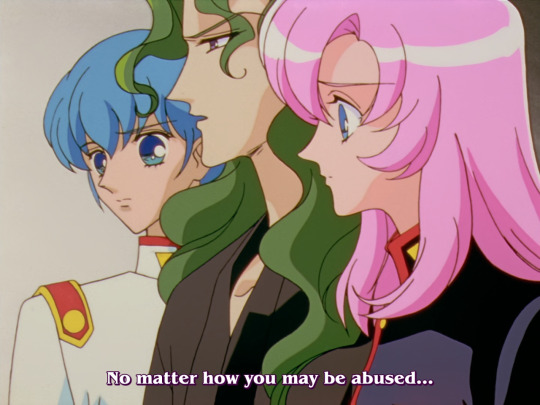


yet another moment where saionji says something incredibly trenchant and insightful only to be completely dismissed due to the ridiculous framing and the general cringiness that pervades everything he says and does (eg, pointing out that the castle is a trick of the light, announcing that they must shed the coffins end of the world has prepared for them, etc etc). obviously in this instance, he is both saying something that is proven correct throughout the show via a myriad of dynamics, but is also shown to be a precept that is teleologically challenged and rejected by anthy’s final choice.
upon a first viewing, one might assume saionji himself is talking about anthy here, whether by presumptuously assuming that she loves him despite his abuse, or claiming that her rejection of him does not lessen his love for her. either way, he seems totally delusional and moronic. i can only assume that utena, who has even less information than we do regarding saionji’s true feelings, assumes that he is talking about anthy, and thus dismisses him out of hand for being a violent idiot. and rightfully so. but also, he’s clearly not talking about anthy, even if he may think he is (or at least would claim that he was if questioned). and this statement is truly definitional to his relationship to touga, whom he resents, envies, and maybe even loathes, but whom he cannot seem to ever actually abandon.
even when he’s given the chance to start fresh, he returns to ohtori (and in this case you can say that it’s because he has nowhere to go, no family, the outside world is scary, ohtori is all he knows, he felt he had no other choice… but this was also true of anthy, and she eventually found the courage to leave! it’s very very hard, but it’s not impossible, which is the point). even as he vocally condemns akio’s system, he nonetheless participates in it, albeit reluctantly, for touga. he is freer, healthier, and kinder in wakaba’s dorm, but he is also deeply unhappy. which isn’t to say that he ever seems happy (at least, not after losing the rose bride), but his unhappiness in “wakaba flourishing” is that of depression, whereas his unhappiness around touga is that of resentment. he’s rightfully angry over constantly being mistreated, but at least he’s not lost. he has a purpose. even if it’s just the purpose of receiving abuse and putting up a futile fight, it’s a role he can play with the only person who has ever truly mattered to him. it’s all he knows; it’s the closest thing he has to real love. and so he stays.
nanami is in a very similar situation as saionji is. they both idealize a version of touga who never really existed, and cling to him despite his blatant mistreatment of them because he is the only person who has ever shown them true affection in their entire lives. he manipulates them, makes a laughingstock of them, facilitates and participates in sexually abusing them, but also makes sure that they are too dependent on him to leave them. nanami is even more blatant in illustrating this idea than saionji is, as for most of the show, she does not even resist against touga like saionji does, rather she purely venerates and worships him, to the point of parody. he is a terrible brother to her, but in such a way that makes it seem like he’s actually a good brother to an obnoxious, ridiculous sister. he is actively grooming her, and she has nowhere to run, because he has fashioned himself her entire world. she cannot fathom a world beyond his limits, her very own personal end of the world.
it’s somewhat unclear whether touga thinks that controlling saionji and nanami is necessary to keeping them around, or whether he only wants them around because he enjoys assuming control over others. it’s probably a mix of both. he probably does hold some affection for them, but cannot conceive of a way to keep them as close to him as he would like without exploiting them, because he believes that true friendship is for fools and true love is impossible. to touga, if every relationship must be imbalanced in some way, then he at least wants to be the one with the power in his deepest relationships, unaware (or at least, willfully ignorant) of the fact that by corrupting and perverting their dynamics, he is slowly tainting their naive childhood love and affection that drew them to him in the first place. so in touga’s case, he inverts saionji’s logic to refigure it as “love can only be facilitated through abuse, no one will truly show you love unless they have to (through exploitation).” it’s the logic of someone who sees the world through an almost 2D framework of abuse, exploitation, transaction, and control. it’s the logic of someone desperately sad and desperately cynical. nanami is very wise (and brave) to ultimately reject him/it, even though it, too, is all she knows.
tsuwabuki complicates the nanami/touga dynamic by aspiring to inhabit both their roles simultaneously, and so he allows himself to be subjected to nanami’s exploitation while simultaneously subjecting her to violence. he is happy to be abused by nanami not because he loves her per se, but because their abuse is mutual. shiori and juri have a similar dynamic, wherein they are both at fault in different ways, both attempt to avoid the other (physically and psychologically) and yet constantly collide like magnets. however, the i would argue that the abuse they face is largely systemic, and their behaviors are primarily a symptom of their internalized homophobia rather than overt malice (even though shiori may pretend otherwise). miki and kozue’s tension is also mutual. they both harm the other despite loving them deeply. because love is not a bandaid that revolves all pain, misunderstanding, and miscommunication. see: the utena and anthy ledge scene.
finally, i think this quote is actually most powerful when figuring it through the lens of utena, anthy, and akio. of course, akio has fostered a dependency in anthy much like touga has with nanami, and so she does not know how to leave him despite being in incredible pain at his hand. but she is not “happy,” as saionji puts it. she is the most miserable girl in the world. she doesn’t love akio as much as she loves the memory of him, the idea of dios (which is of course also true for nanami and saionji re: touga, arguably also true for juri re: shiori, miki re: kozue, etc etc) — but anthy needs akio. or at least, akio has convinced her that she does. he is end of the world, she cannot envision a life beyond his imposed limits.
but i actually find it more interesting with regards to utena and akio. i don’t think at any point in the show, utena ever actually has real, romantic feelings for akio. i think that she is terrified of him, and in her desperate feelings of trapped helplessness as he ensnares her, she convinces herself that those heart palpitations, startled movements, shocks and thrills she feels in her presence is the emotional response not of fear, but of affection. but we know that in anthy’s presence, she doesn’t feel afraid, she feels calm, relaxed, happy. being with anthy isn’t wildly exciting, constantly requiring rationalizations to explain away the dread and internal rejection she feels towards akio’s advances. being with anthy feels like coming home. and it’s why she is initially so happy to be accepted into anthy’s family, to have a big brother like akio, to live under their roof. in utena’s naive, hopeful mind, she is joining anthy’s family in the most innocent possible sense. and she endures it, the grooming, the abuse, the rape, the end of the world; she fights til her very last breath, because she is in love. no matter how [utena] may be abused (by akio), she’s always happy to be near the one she loves (anthy).
#remind me to write an analysis on the moniker ‘end of the world’ next#bc i only rly allude to that here#id in alt text#u#analysis#manalysis#saionji#utena#touga#anthy#akio#nanami#miki#kozue#juri#shiori#tsuwabuki#dios#utenanthy
404 notes
·
View notes
Text
Dios, si algún día estoy a punto de perder la esperanza, ayúdame a recordar que tus planes son más grandes que mis sueños.
-Notas del Cielo
#dios#blog cristiano#cristianos#frases cristianas#biblia#evangelio#textos cristianos#reflexiones cristianas#blogger cristiano#jovenes cristianos
453 notes
·
View notes
Text
La verdad es que me habría rendido muchas veces este año que pasó si no fuera por la mano de Dios y su cuidado por mí.
Autor: Ryan Lucas //.
#frases en español#escritos#textos#frases#citas#notas#amor#pensamientos#escritores#seguen#cosas que importan#god#dios#amor propio#salud mental#sentimientos#enero2024#pub8#cosas de la vida
342 notes
·
View notes
Text
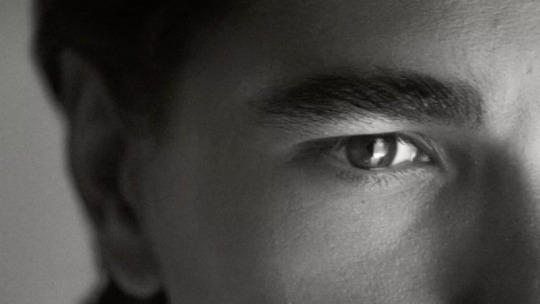
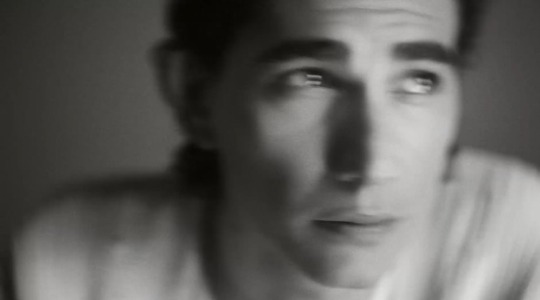

Enzo Vogrincic for Zara Man 🤍
151 notes
·
View notes
Text
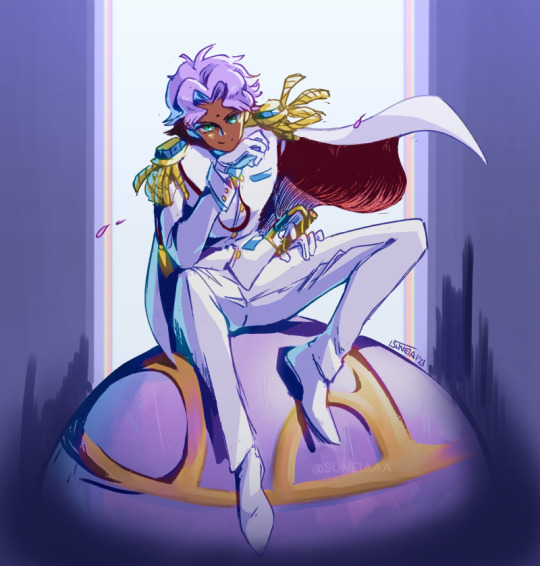
Dios
572 notes
·
View notes
Text



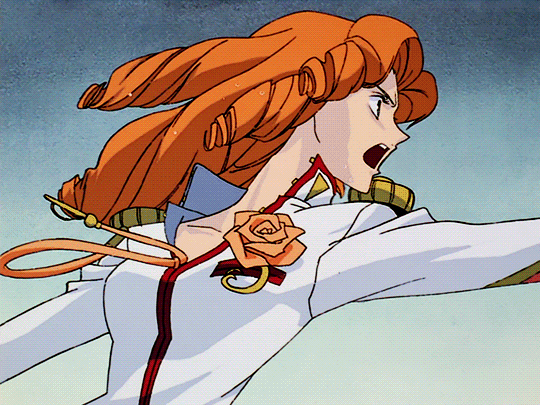

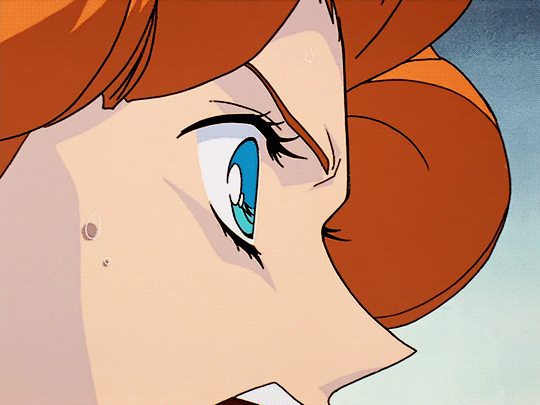
#flashing#a#shojo kakumei utena#revolutionary girl utena#juri arisugawa#utena tenjou#dios#ruka tsuchiya#shiori takatsuki
83 notes
·
View notes
Text
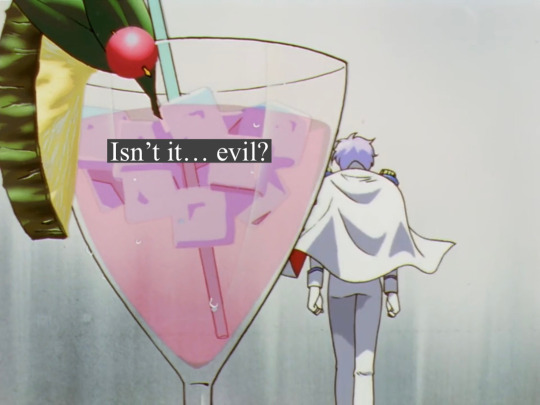
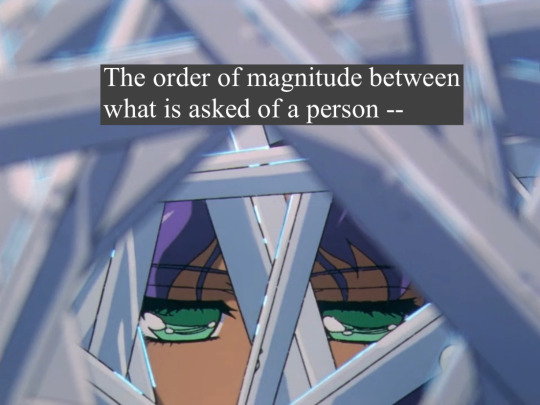
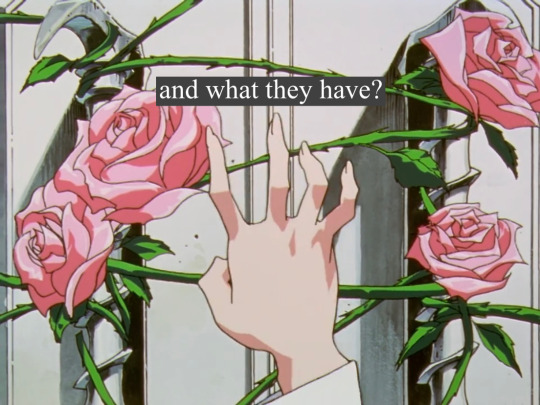
Alt text: screenshots from the finale of revolutionary girl Utena with overlaid text. 1: Prince Dios walks away, leaving behind an untouched cocktail. text reads: "Isn't it... evil?"
2: Anthy's eyes peer out from behind the million swords of hatred. text reads: "The order of magnitude between what is asked of a person --"
3: Utena's hand grasping at the thorny rose vines covering the door to eternity. text reads: "and what they have?" End alt text
418 notes
·
View notes
Text
Que os meus desejos não se tornem empecilhos ao te servir, Senhor.
ESE meditando em Mateus 4:2,3
#eu sou evangelico#eu sou evangelica#ese#jesus#bible#biblia#cristo#Deus#Dios#Gd#quote#quotes#projetofalandonocéu#mateus#desejo#vontade#cristianismo#gospel
148 notes
·
View notes
Text
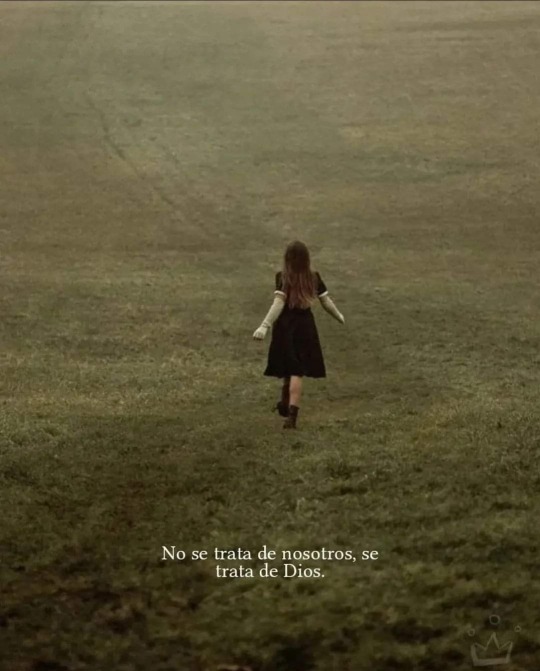
#sublime redentor#imagenes cristianas#imagenes de dios#dios#cristo#redentor#jesucristo#sublime#imagenes de cristo#biblia
105 notes
·
View notes
Text

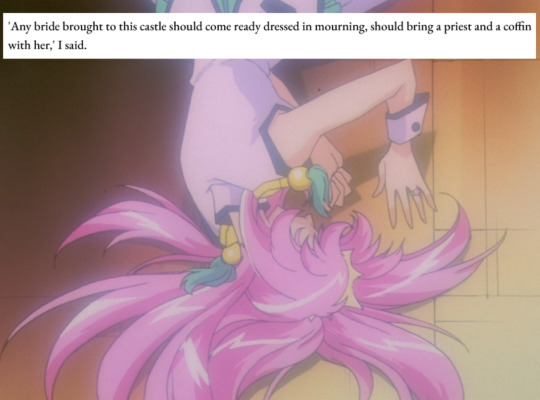
The Bloody Chamber, by Angela Carter
Revolutionary Girl Utena, dir. Kunihiko Ikuhara
75 notes
·
View notes
Text
In Defense of Akio Ohtori

While many fans of Revolutionary Girl Utena would refrain from employing such reductive terms to describe a narrative that so heavily critiques and deconstructs the role of archetypal figures in storytelling, it is nonetheless a widely held belief, albeit implicitly, that Akio constitutes the ultimate “villain” of the narrative. Akio constructs the borders through which their world is framed, and is thus uniquely culpable for all its violence. And yet, I would like this challenge this notion somewhat. While Akio may be the primary frame through which the narrative is constructed, we cannot ignore the hints that this narrative may also be, at least in part, retroactively framed. During the famous “Cantarella scene,” for example, the audience is shown that Utena and Anthy will ultimately escape the world of Ohtori through a cut to an empty room, time overlapping as the possibility to imagine a future becomes realized. Thus, if the narrative lies partially beyond Akio’s scope, it is fair to argue that Akio is being framed just as much as he frames others.
No character within the narrative, whether a bit player or a protagonist, is bereft of a complex psychological motivation underpinning their every action. So why is Akio, one of the most crucial players in the show, denied his nuanced psychological portraiture? Akio is as complex as any other character, if not more so, and thus merits our attention and analysis. In this essay, I will read Akio through a framework of Lacanian psychoanalysis as I interrogate and unpack the deeper implications and motivations that indubitably undergird his challenging and variegated psychological landscape, in an attempt not only to understand his violent patterns of behavior, but also, even, perhaps, to justify them.
lol jk guys happy april fools
#u#revolutionary girl utena#rgu#shoujo kakumei utena#sku#akio ohtori#akio#dios#analysis#manalysis#:)
158 notes
·
View notes
Text

#vida#realidad#viral#frases de la vida#amor de dios#escritura#amor propio#notas de vida#fe en dios#frases#palabra de dios#promesas de dios#diosesamor#cristo#cristianos#dios#jesucristo
246 notes
·
View notes
Text
A veces Dios permite que alguien que te ha fallado mucho en el pasado, vuelva a tu vida, no por el destino ni mucho menos para reabrir heridas cerradas en tu corazón, sino para sondear tu reacción, para saber si has superado este asunto, si has descubierto tu valor, si has aprendido a quererte.
- Seguen
#fragmentos adolescentes#citas#textos#frases#notas#escritos#fragmentos#amor#pensamientos#citas en español#realidad#sentimientos#agosto2023#seguen#seguen oriah#Dios
203 notes
·
View notes
Text
¿Alguna vez te has detenido a pensar que muchas veces sufriste porque querías encajar en algo que Dios no quería para ti?
#dios#blog cristiano#cristianos#frases cristianas#jovenes cristianos#biblia#evangelio#textos cristianos#reflexiones cristianas#blogger cristiano
264 notes
·
View notes